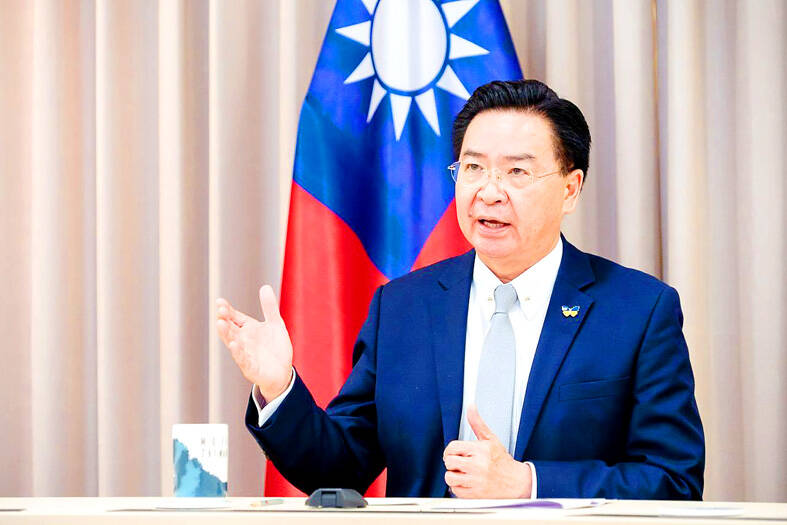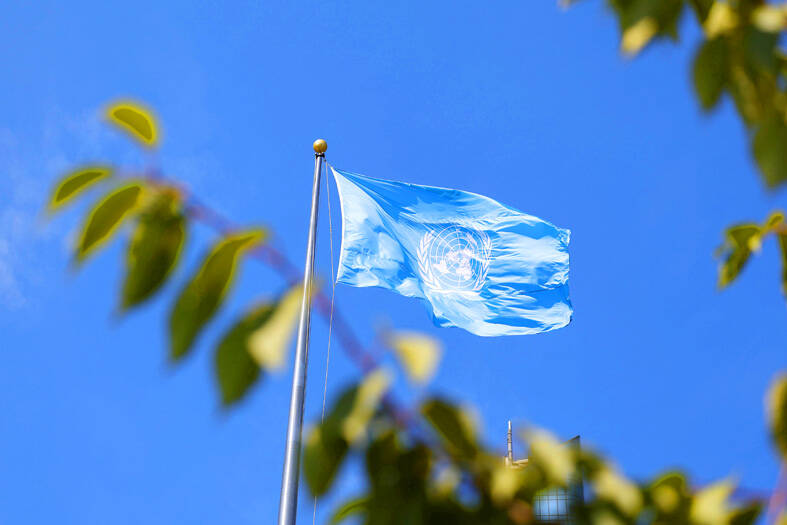Minister of Foreign Affairs Joseph Wu (吳釗燮) has called for Taiwan’s inclusion in the UN framework to help ensure peace in the region, as the world body is slated to begin its 78th session of the general assembly on Tuesday next week.
“Together we are stronger. It is time to act on this fundamental principle, including Taiwan,” Wu wrote in an op-ed published on Saturday on the Italian news site Le Formiche.
The UN Charter, which states that international disputes should be settled peacefully, has helped maintain the rules-based international order since the end of the Cold War, he said.

Photo courtesy of the Ministry of Foreign Affairs
As evident in Russia’s invasion of Ukraine, war in a globalized world brings global consequences, he said.
“It is therefore imperative to prevent similar threats to global security from occurring elsewhere,” he added, referring to China’s threats against Taiwan.
The People’s Republic of China, which has never governed Taiwan, has refused to renounce the use of force against its neighbor to annex it, he said.

Photo: AFP
China “has become increasingly aggressive, flexing its military muscle to intimidate Taiwan” by sending warplanes and ships into areas near Taiwan, as well as through disinformation campaigns and economic coercion, Wu said.
In addition to Taiwan, China has been expanding its power in the East and South China seas, he said, citing examples of Beijing signing a security agreement with the Solomon Islands and securing ports for potential military use in the Indian Ocean.
“Ensuring peace and stability in the Taiwan Strait is in everyone’s interest” as half of the world’s commercial container traffic passes through the Strait every day and Taiwan is a major producer of semiconductors, he said.
The international community has repeatedly emphasized the importance of cross-strait peace and stability, he said, adding that “the best way to do so requires inclusion, dialogue and, above all, unity.”
Taiwan is willing and able to be a part of the UN to tackle pressing issues through global discourse, but was excluded due to China’s distortion of UN Resolution 2758, he said.
That resolution does not affirm that Taiwan is a part of the People’s Republic of China, nor does it give Beijing the right to represent the people of Taiwan within the UN, Wu said, adding that the resolution only addressed China’s representation in the UN.
“The subsequent misrepresentation of Resolution 2758 contradicts the fundamental principles upheld by the UN Charter and must be rectified,” he said.
Wu urged the UN to “act as a champion of progress” by including Taiwan, which would “demonstrate the determination of the UN to unite for global peace at a critical moment when the future of the world is at stake.”
He said that the UN could start by allowing Taiwanese individuals and journalists to attend UN meetings, and permit Taiwan’s meaningful participation in efforts related to the UN Sustainable Development Goals, which would benefit the world.

INVESTIGATION: The case is the latest instance of a DPP figure being implicated in an espionage network accused of allegedly leaking information to Chinese intelligence Democratic Progressive Party (DPP) member Ho Jen-chieh (何仁傑) was detained and held incommunicado yesterday on suspicion of spying for China during his tenure as assistant to then-minister of foreign affairs Joseph Wu (吳釗燮). The Taipei District Prosecutors’ Office said Ho was implicated during its investigation into alleged spying activities by former Presidential Office consultant Wu Shang-yu (吳尚雨). Prosecutors said there is reason to believe Ho breached the National Security Act (國家安全法) by leaking classified Ministry of Foreign Affairs information to Chinese intelligence. Following interrogation, prosecutors petitioned the Taipei District Court to detain Ho, citing concerns over potential collusion or tampering of evidence. The

‘FORM OF PROTEST’: The German Institute Taipei said it was ‘shocked’ to see Nazi symbolism used in connection with political aims as it condemned the incident Sung Chien-liang (宋建樑), who led efforts to recall Democratic Progressive Party (DPP) Legislator Lee Kun-cheng (李坤城), was released on bail of NT$80,000 yesterday amid an outcry over a Nazi armband he wore to questioning the night before. Sung arrived at the New Taipei City District Prosecutors’ Office for questioning in a recall petition forgery case on Tuesday night wearing a red armband bearing a swastika, carrying a copy of Adolf Hitler’s Mein Kampf and giving a Nazi salute. Sung left the building at 1:15am without the armband and apparently covering the book with a coat. This is a serious international scandal and Chinese

Seventy percent of middle and elementary schools now conduct English classes entirely in English, the Ministry of Education said, as it encourages schools nationwide to adopt this practice Minister of Education (MOE) Cheng Ying-yao (鄭英耀) is scheduled to present a report on the government’s bilingual education policy to the Legislative Yuan’s Education and Culture Committee today. The report would outline strategies aimed at expanding access to education, reducing regional disparities and improving talent cultivation. Implementation of bilingual education policies has varied across local governments, occasionally drawing public criticism. For example, some schools have required teachers of non-English subjects to pass English proficiency

TRADE: The premier pledged safeguards on ‘Made in Taiwan’ labeling, anti-dumping measures and stricter export controls to strengthen its position in trade talks Products labeled “made in Taiwan” must be genuinely made in Taiwan, Premier Cho Jung-tai (卓榮泰) said yesterday, vowing to enforce strict safeguards against “origin laundering” and initiate anti-dumping investigations to prevent China dumping its products in Taiwan. Cho made the remarks in a discussion session with representatives from industries in Kaohsiung. In response to the US government’s recent announcement of “reciprocal” tariffs on its trading partners, President William Lai (賴清德) and Cho last week began a series of consultations with industry leaders nationwide to gather feedback and address concerns. Taiwanese and US officials held a videoconference on Friday evening to discuss the